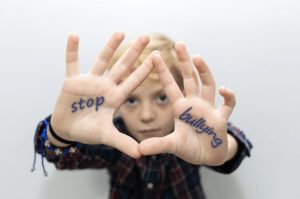Parents need to understand different forms of bullying
Parents don't often ask me about different forms of bullying. I think most people just think of bullying as a blanket issue but it's not. In support of National Bullying Awareness Month I decided to focus on this topic this week as well as encourage you to listen to this week's podcast which has helpful information about what actually works in anti-bullying programs.
Online. Social Media. Texts. Cellphones.
Much of a pre-teen and teen's life occurs online. Earlier this year while I was giving a talk at a middle school the students shared stories about how cruel other kids were to them online. There was a sense of powerlessness with how fast and expansive a threatening or embarrassing post can be.
When I subsequently did a parent talk about how to help kids with bullying issues I shared the following information that I think all parents need to consider while raising kids in a digital age.
Four Types of Bullying
Verbal bullying is saying or writing mean things. Verbal bullying includes:
Social bullying, sometimes referred to as "relational aggression" involves hurting someone’s reputation or relationships.
Physical bullying involves hurting a person’s body or possessions.
Cyber bullying- Cyberbullying is bullying that takes place over digital devices like cell phones, computers, and tablets. Can occur through text and apps, or online in social media, forums, or gaming where people can view, participate in, or share content.
Cyberbullying includes sending, posting, or sharing negative, harmful, false, or mean content about someone else. It can include sharing personal or private information about someone else causing embarrassment or humiliation.
Warning Signs a Child is Being Cyberbullied or is Cyberbullying Others
Many of the warning signs that cyberbullying is occurring happen around a child’s use of their device. Some of the warning signs that a child may be involved in cyberbullying are:
- Noticeable increases or decreases in device use, including texting.
- A child exhibits emotional responses (laughter, anger, upset) to what is happening on their device
- A child hides their screen or device when others are near, and avoids discussions about what they are doing on their device.
- Social media accounts are shut down or new ones appear.
- A child starts to avoid social situations, even those that were enjoyed in the past.
- A child becomes withdrawn or depressed, or loses interest in people and activities.
What To Do
If you notice any of these signs take steps to investigate your child’s digital behavior. Because cyberbullying happens online, responding to it requires different approaches. If you think that a child is involved in cyberbullying, there are several things you can do:
Monitor – recognize if there has been a change in mood or behavior and explore what the cause might be. Try to determine if these changes happen around a child’s use of their digital devices ad monitor their devices.
Talk – ask questions to learn what is happening, how it started, and who is involved.
Document – keep a record of what is happening and where. Take screenshots of harmful posts or content if possible. Most laws and policies note that bullying is a repeated behavior, so records help to document it.
Report – most social media platforms and schools have clear policies and reporting processes. If a classmate is cyber bullying, report it to the school. You can also contact app or social media platforms to report offensive content and have it removed. If a child has received physical threats, or if a potential crime or illegal behavior is occurring, report it to the police.
Support – peers, mentors, and trusted adults can sometimes intervene publicly to positively influence a situation where negative or harmful content posts about a child. Public Intervention can include posting positive comments about the person targeted with bullying to try to shift the conversation in a positive direction. It can also help to reach out to the child who is bullying and the target of the bullying to express your concern.
If possible, try to determine if more professional support is needed for those involved, such as speaking with a guidance counselor or mental health professional.
Happy Parenting!
